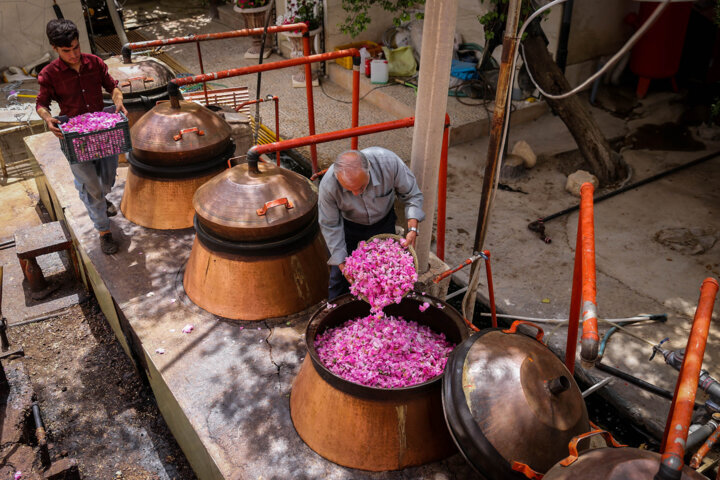Visitors flock to central Iran for rosewater festival

TEHRAN – A rosewater distillation festival, commonly known as “Golab-giri”, was held in Khomein county, central Iran, Khomein’s tourism chief has said.
On Thursday, the two-day festival opened in the village of Shahabieh during a ceremony attended by hundreds of cultural and tourism officials, Ali Mashhadi explained on Saturday.
Performing traditional music, making local foods, and Gol Ghaltan (a ceremony in which people roll babies among the roses to give them joy and refreshment) were parts of the festival, the official added.
A major aim of the festival was to promote the cultivation of rose flowers and floriculture as well as studying florists’ issues and problems to find solutions and promote this industry in the region, he noted.
Golab or rosewater is obtained from a particular kind of Rose, known as Mohammadi roses in Iran. Harvesting flowers seems to be the most important part of the process. They should be picked from dawn through morning very carefully. The petals are put into massive copper pots and boiled, and then the extracted water is kept in special bottles. The longest the distillation is, the better will be the quality of the rosewater.
Golab is used nationwide in diverse traditional dishes to flavor them or consumed as a religious perfume as well. The holy month of Ramadan is one of the bestselling months for the product.
The distillation of flowers and herbs has a deep history in Iran. Many believe traditionally distilled rosewater is of higher quality than that produced in factories probably due to shorter time intervals between the harvest and distillation practices.
Harvesting damask rose flowers is somewhat intensive work. It is mostly performed from dawn through the morning. Delay in harvesting or transport to distillery results in decreased essential oil quantity and quality.
To extract the rosewater people first amass their petals to put them into the massive copper pots. Then the pots are put on traditional ovens made from bricks, stones, and mud.
Almost every 30 Kg of rose petals plus 80 liters of water is poured into each pot that is connected to metal pipes for the steam moving through to obtain the hydrosol. The waste of distillation is used for feeding livestock or composting.
ABU/AFM
Leave a Comment